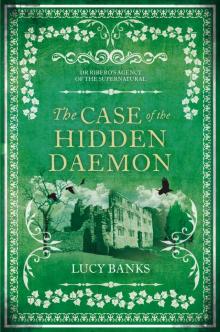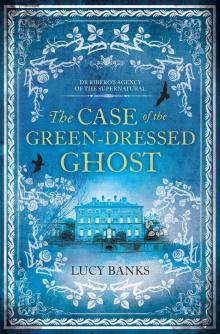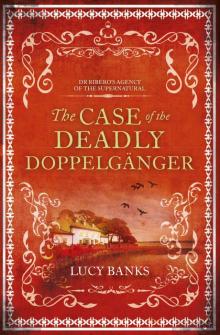- Home
- Lucy Banks
The Hanged Man and the Fortune Teller Page 8
The Hanged Man and the Fortune Teller Read online
Page 8
“Sorry, what were we talking about?” he says finally.
Agnes sighs. “It happened again, didn’t it?”
“What?” he asks, although he knows exactly what she’s referring to.
“You keep forgetting things.” Her expression darkens, and she drifts into mistiness. “Don’t think I haven’t noticed; it’s obvious. You’ve been forgetting my name too. I sometimes wonder if you remember how we met.”
He thinks, long and hard. The vague details are there; her gaudy tent, the shining glass ball on her table. He remembers talking to her, long into the night, after she’d been crying. And he knows that a man had hurt her. A Strong Man, he thinks, incomprehensibly. In gladiator boots and a leotard.
“I do remember.”
“I think you’re remembering less.” Suddenly, she dives towards the door, gesturing outside. “Come on. We can’t lurk in here all night. It doesn’t seem proper with the owners of the house away.”
The ghost smiles at her unexpected propriety. “I suppose you’re right.”
Together, they venture out, emerging like tentative mice from a hole. The aeroplanes have gone, for now, and the street is empty. It’s unnaturally dark, and for a moment, the ghost wonders why, before realising; they’ve put all the lights out. Presumably to make the area harder to see from above.
“How many people died tonight, do you think?” he asks, then is immediately horrified by his casual tone. This is one of the problems of having died oneself; death suddenly becomes very mundane and unexceptional. He knows he should show more respect to the living.
“Too many to count, poor souls.”
They pass street after street; some torn apart by the bombs, others incongruously undamaged, as though belonging to another place in time. St Magnus the Martyr, to his great relief, is still standing, its spire jutting defiantly to the sky.
“My old house is down there,” he says, pointing down the narrow road. “Well, it was, anyway. It was destroyed earlier today.”
Agnes gives him a strange look. “You’ve told me where your house was before, you know. In fact, you’ve taken me there a few times in the past, don’t you remember?”
He thinks hard. In truth, he can’t recollect doing so, but he doesn’t want to admit it. “Perhaps,” he says eventually, aware that he’s not fooling her. She can read him unnervingly well.
“How has Helen been?” she asks, after a while. “And her family?”
The ghost ponders the question. Helen has been the same as she always seems to be; strong and unflappable to others, slowly crumbling away inside. Sometimes, he watches her, sitting up in bed, holding a book but not reading it, and he worries about her; about the silent turmoil that wrenches her in two. Her fear for her husband is a palpable, bloated thing, a silent, awful pressure that she bears every day.
“She is frightened that her husband is dead,” he says simply.
Agnes nods. “The same can be said for every wife in this city. I don’t know how they carry on while bearing such a weight.”
“Where do you suppose the men have been sent?”
The Fortune Teller shrugs. “To fight the Germans, I suppose. That’s all I keep hearing, whether I’m at the market, or the Docks, or the schoolyards. It seems strange, that the country is fighting them again, after the Great War.”
The Great War? he wonders, then remembers. There had been another war, not so long ago, only it had been nothing like this one. There had been no bombings, no devastation and destruction; or at least, not on this level. The country, which had once been so stable, so certain of itself, had been reduced, bullied into submission. Will it ever recover? he questions, looking around. How on earth can they rebuild all of this?
“At least Helen has her children at home,” Agnes continues, as they turn the corner. “Some women have had to say goodbye to their husbands and sons.”
They wander onwards, past the more respectable dwellings, towards the shabbier, less welcoming streets. Here, houses huddle like plotting men, their black windows staring at passers-by like a series of hostile eyes. A man leans against a wall, cigarette in hand; as though it was any other normal night, and not a time when all hell broke loose upon the city. The ghost admires this quality in Londoners; the ability to simply stiffen one’s resolve in the face of adversity, and calmly continue regardless.
“These streets are familiar,” he notes suddenly, observing the corner shop nearby, its windows crammed with posters and handwritten advertisements. He has walked here before, many times, he thinks.
“It’s Whitechapel,” Agnes says patiently. “You used to work here, when you were alive. Don’t you remember? Even I remember you telling me that.”
The ghost tests the name. Whitechapel. It seems familiar, and an image springs to his mind of a desk, a neat tray with correspondence in it, a ledger. Similar desks around him, each occupied by earnest, suited men; some bespectacled, others with balding heads that glinted in the dusty sunlight.
“Yes, I can recollect that,” he says, fighting to conceal his happiness, as it seems somehow unnatural on such a bleak night. Yet it is such a joy to him when these memories come to him, fully formed and accessible. Once, he would have taken such a thing for granted, but these moments of clarity are too rare not to be appreciated now.
But there is something else, a darker, more frightening memory, layered just behind this one; a memory he can’t properly access. He stops beside a school, its brick façade a mass of shadows.
“This isn’t right,” he mutters. “This wasn’t here back then.”
Agnes sighs, then flickers to a halt. “Lots of things are different now.”
He knows that, but this is more significant. Something important happened here, something terrible, and he was witness to it, he is sure. A name passes through his mind, Dutfield’s Yard, but there’s no sign of any yard around here, only this solid, incongruous school, sat primly on the street, defying him to disagree with its existence.
“Perhaps this was the place I once worked,” he mutters, though the words ring hollow. He knows it is something more than that, but he can’t grasp the details. A figure, sidling away. A woman on the ground. Blood, and lots of it. His brother. Fred.
The Fortune Teller waits patiently, then nudges him, her cloak glittering for a moment, like the reflection of stars on a distant lake. “Come on,” she says. “It doesn’t do to dwell too much on the past. We should keep moving forward.”
Moving forward to where? he thinks. What is it exactly that they’re pressing towards, and is there any point?
They drift for miles, through parts of the city that are ravaged and burning, and parts that have survived entirely intact. It fascinates him, how the bombs have changed the landscape, how their impact will resonate with bell-like clarity for years to come. For these old buildings, these monuments, landmarks and pieces of the past; they’ll never be reclaimed. A single explosion has levelled them out to nothing. Sometimes, time eases things away slowly, he thinks, as he continues. Then at other times, it eradicates everything in a single moment.
Morning comes, the sun rising with inappropriate brightness, hazy through the smoke and floating ash. The fires burn on, some with continued fervour, others tiring to smouldering heaps of embers. The aeroplanes return, a mass of whining drones above them, deposit another barrage of bombs upon the already defeated city, then finally race into the distance. People return, hollow-eyed, smudged and worn, and the ghost can feel their loss, their mute, disbelieving sense of horror. It is an attack that none of them saw coming, even though they had been warned. And it is an attack that has left many without a home to return to.
He floats back to Helen’s home, Agnes beside him. To his pleasure, it still stands, as resolute and pragmatic as it had been the night before; one of London’s survivors. Another window has been smashed, no doubt by the force of a neighbouring bomb, but aside from the crumbs of glass scattered across the kitchen floor, the
house is entirely intact.
His heart lifts. He knows this will mean everything to Helen.
“When do you think they’ll return?” Agnes asks, taking her position by the mantelpiece.
“Soon.” He is sure of it. Helen won’t be able to stay away for long. If they return at all, he thinks, then hastily pushes the thought away. Of course they will. As Helen’s mother had said before, the station was only a short walk away. They would have made it, and they’ll make it back, he is certain.
Sure enough, an hour later, just after the clock has dinged a quiet rhythm marking the passing time, the door handle turns. The door thuds open. The family returns in a cacophony of excited chatter, heavy footsteps, and breathless wonder.
“See,” Helen’s mother exclaims, propping her walking stick in the corner. “I told you everything would be all right, didn’t I, love?”
Helen’s relief is painted across her face, washing over her like warm water. “Thank heavens, eh, Mother? I don’t know what we would have done if—”
“Hey, Ma,” her son shouts, head protruding from the kitchen door like an overeager puppy. “The kitchen window’s got all smashed up. Come and have a look.”
They bustle into the cramped space, yet the ghost can feel their happiness, concealed under a vague veneer of concern.
“Yes, we’ll have to get someone to replace that quickly, what with October around the corner,” Helen’s mother declares, rolling up her cardigan sleeves. “And the other one, it’s about time, really.”
“October’s not here yet, Mother, September’s only just started—”
“You know what I mean, dear.”
Helen chuckles, places her hands on her waist. “We’ve got nothing to complain about, considering what’s happened to other parts of the city. Let’s get this cleaned up. Benjamin, move away, will you? Last thing we need is you cutting yourself.”
“Can I have a bun first? I’m starving.”
The ghost smiles, revelling in their contentment, even though he suspects it’s only fleeting. This war isn’t over, he can sense it, the impending danger, the protracted hostility over the years. It looms over London like a dirty fog, seeping into corners, tainting the brickwork. And still, he has the notion—no, the knowledge—that this will not end happily for Helen, nor for her children or mother. He suspects that Helen knows it too, otherwise why would she cry herself to sleep each night, while clutching one of her husband’s old shirts?
Agnes sidles over, slipping comfortably into the space beside him.
“You’re thinking about the darkness here, aren’t you.” It’s a statement, not a question.
The ghost nods. “It seems so unfair. Helen is a good person.”
“Well,” Agnes waits, watching as the glass shards are hustled onto the dustpan, “that is life, isn’t it? Bad things happen to good people. You and I should know that, more than anyone.”
He feels the truth in her words, but cannot verify it in his mind, for the truth is, he has forgotten what happened to him when he died. There are only loose, floating segments of memory, indistinct images that make no sense. He sees Eleanor’s hand, reaching to him, but it is wet, and glistening in the moonlight. Why is that so? What happened? And why, when he remembers his brothers, does it feel like a visceral punch in the gut? None of it makes any sense, but he’s reluctant to force it. If the truth chooses to remain buried, perhaps it is for the best, he thinks.
“What do you remember of your life?” he asks her, eager for distraction.
“All of it,” she says simply. “Laid out behind me like a quilt. I haven’t forgotten a single detail.”
He looks away, hearing the barbed accusation, simmering beneath the surface of her words. It isn’t his fault he’s forgetting things, he’s sure of it.
“What about the man who was strong?” he asks.
“You mean the Strong Man? Ernst?” Agnes looks at him in disbelief. “Surely you remember Ernst, and what he did to me? You were there, after all.”
I was there, he tells himself. Only, I don’t remember the Strong Man’s face, or his name, until a moment ago. As for what he did to Agnes, I haven’t got a clue.
“Did he hurt you?” he says uncertainly. “Ernst wasn’t a good man, that’s correct, isn’t it?”
The Fortune Teller only shakes her head. “You really are forgetting things,” she says, with infinite sadness. “And who knows when it will stop? How can I stay here with you, when your memory of who I was is draining away?”
Draining away. Those words, they are apt. It feels like a slow, gradual decline, and for a moment, he sees the future as it may be for him—endless days of dreamlike forgetfulness, an existence in which nothing makes any sense. It is a horrifying thought.
Then he realises. She is threatening to leave, if he cannot change. And then he will be alone, drifting aimlessly from decade to decade, a lost, sad soul without a single person to talk to.
“I will make sure I get my memory back,” he says, watching as Helen and her family retreat to the living room. “I promise.”
Agnes looks at him sadly. “You’ve said that before. I wish you would let me help you.”
The ghost says nothing, only shrugs, because he doesn’t believe anyone can help him. Not now, anyway.
The next day, he notices that she is not there. She has slipped away, as she did before, without a farewell or even a warning. Was it to teach him a lesson? To make him appreciate her presence by emphasising the misery caused by her absence? He worries that this time, it is for good. Then where will he be?
The bombs keep falling. Day after day, the grating buzz of the aeroplanes fills the skies, until the people of London scarcely register the noise. It has become a part of their existence, an airborne disease that they tolerate, whilst fearing its effect. As for the people themselves, they have become grey, half-dead things; and even the London humour is fading, the characteristic twinkle of the locals’ eyes dimming to weary stoniness.
The ghost stays with Helen and her family, remaining in their house on the nights they flee back to the underground station, wondering if his presence somehow protects the surrounding walls, makes the bricks impervious to attack. He contemplates where the Fortune Teller might have gone. Agnes. He must keep saying her name, as it is important.
The darkness still lingers in the house. Each time they retreat to the safety of the underground station, he wonders if they will not return; if their destiny is already neatly sewn up, and the days are just waiting to play out, like a scripted performance. Yet each time they come back, a little more worn and dishevelled than the last; and he is happy that they have survived one more day.
Helen’s mother suggests sending the children to the countryside. The ghost can see how much pain even the idea causes. Helen fears the death of her children, but she fears their absence more; he can sense it coming from her, rich and pungent as vixen scent. She believes something terrible will happen if they leave her sight, the ghost realises. She senses the darkness too, and she’s preparing to fight it, with everything she’s got.
But London is no place for children anymore. Even Helen knows that, and as her neighbours send their children to Devon, to Somerset, to Sussex, she knows she must too. Only for her, it feels more like losing another part of herself, crumbling into solitude until everything she loves seems like a faded memory. It is an emotion the ghost understands only too well.
The son and the daughter are sent away. The daughter looks solemn as the train pulls away, but the son is already staring in the opposite direction, the new adventure pulling him away before his physical self has even fully departed. Helen’s mother pats her eyes with a rumpled handkerchief. Helen refuses to cry, but the tears are there, suppressed just below her throat, and shoving against her eyes. She is a geyser, ready to erupt; but when she does, it will be a silent explosion, a detonation that blasts no one but herself.
The house is larger without two young peop
le racing from room to room. The sounds echo without the soft press of a child’s body to bounce from. Without children to give the home meaning, it becomes little more than a stage, every movement a little less driven, a little more performed. Helen’s mother settles by the gas fire, knitting an endless, mud-brown scarf. Helen bites her nails and listens for further news on the metal box with the dials, the thing she calls a wireless.
The ghost waits too. Sometimes, he thinks he senses the Fortune Teller, the warmth of her essence flitting somewhere close by. But then, before he can verify the sensation, it is gone, leaving him wondering, and doubting his own senses. And all the while, the war thunders around them. Death envelops the city like a dirty mist, and it is impossible to imagine life ever thriving here again.
Finally, the day comes when the darkness within the house, Helen’s little home, where happiness was once a daily experience, not a half-forgotten memory, thickens to a soup. The ghost knows, before the door knocker is even rapped, that Helen’s time has come.
Every second that her hand hovers over the door handle stretches into agonising eternity. She chews her lip, and her heart quickens.
The telegram boy, whom the locals have already nicknamed The Angel of Death, stands waiting on the doorstep, holding the card in his hand. She already knows what it says.
The Air Ministry regrets to announce that your husband, Sebastian Skinner, has been killed in action. Letter to follow.
“No,” Helen mumbles, knees already giving way.
“I’m sorry, I’m so sorry,” the boy replies.
This scene, filled with such pain, has with it the terrible sense of inevitability. The dark swirls above Helen’s head sink over her like a shroud, and the ghost notices, as he has in the past, that it is much like a wild beast claiming its victim after a patient, deliberate wait.
He feels constriction where his chest once was, a deep, hollow ache for Helen and for her silent, shaking suffering. And for the suffering of every other soul in this cursed city; mothers mourning their sons, grandparents, still reeling with disbelief that such a thing could happen in their lifetime. Children made into orphans each and every day. And all for what?

 The Case of the Hidden Daemon
The Case of the Hidden Daemon The Hanged Man and the Fortune Teller
The Hanged Man and the Fortune Teller The Case of the Green-Dressed Ghost
The Case of the Green-Dressed Ghost The Case of the Deadly Doppelgänger
The Case of the Deadly Doppelgänger